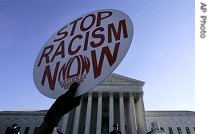2007年VOA标准英语-US Supreme Court Rejects School Integration Pro(在线收听)
Miami
30 June 2007
Critics of racial desegregation plans in U.S. schools have welcomed a Supreme Court decision Thursday blocking some school integration measures. In Miami, VOA's Brian Wagner reports that supporters of desegregation hope to draft new plans that will fit with the court's ruling.
 |
| A demonstrator holds up a sign in front of the Supreme Court as court heard arguments on lawsuits by parents in Louisville and Seattle challenging policies that use race to help determine where children go to school, 04 Dec 2006 file photo |
Racial integration measures have been used in schools across the United States since the 1950s, in an effort to overcome decades of segregation between white and black communities.
In the decision Thursday, Chief Justice John Roberts said the programs are unconstitutional because they were "directed only to racial balance, pure and simple." He then said "the way to stop racial discrimination on the basis of race is to stop discriminating on the basis of race."
Ward Connerly, chairman of the American Civil Rights Institute, said he supports the ruling.
"You cannot use an individual's race, and classify that person according to race, and then craft policies that take into account that person's race," he said.
Supporters of integration measures criticized the court's ruling, saying it will affect hundreds of school districts in addition to the two systems included in the court case. In a debate late Thursday, several Democratic presidential candidates rejected the decision and said the court was becoming too conservative under President Bush.
Indiana University law professor Kevin Brown said he was disappointed by the court's decision because he said it will reverse decades of progress in integrating U.S. schools.
"I think clearly the effect of this is going to be to continue to further the trend that has been going over the last 20 years of increasing the racial and ethnic segregation of our schools," he said.
Brown said the biggest impact of the ruling will be on schools in mostly white communities where officials sought to increase the share of minority students in the classroom.
He added there was some hope for integration measures, however, because of Justice Anthony Kennedy. Although he voted with the majority, Kennedy, in a separate opinion, suggested that he would support new plans to avoid racial isolation or re-segregation in schools.
School officials across the country are expected to closely read Kennedy's opinion for ways to draft new measures that will promote racial integration.
But Ward Connerly says it is a mistake for schools to insist on setting goals for racial diversity.
"The whole pursuit of racial diversity has been a failed pursuit," he said. "It has trumped educational achievement."
Connerly says black students especially have been suffering under the current policies. He says blacks are falling further behind whites in school achievement.
He says more attention should be focused on ways to improve the quality of schools in mostly black communities, and ensure that students finish their education and prepare for a career.